Abstract
Municipal solid waste management is an environmental issue that has received considerable attention from researchers and environmental managers for decades. Supporting the management programs entail policies and regulations related to municipal solid waste. In developed countries, the implementation of environmental policies plays an important role and has a substantial impact on the effectiveness of solid waste management. However, in many developing countries such as Vietnam, the situation and effectiveness of the policy implementation have not been studied extensively. This investigation is conducted to ascertain the situation, limitations, and challenges in implementing solid waste management policy in Vietnam. Then, solutions for the problems and improvements for implementation efficiency are presented. This work used online questionnaires to survey environmental managers in different localities and applied qualitative research method to analyze data. The results show that not all national policies on solid waste management are implemented in all localities. Waste separation is also the foremost concern in municipal waste management in most localities of Vietnam. Most of the localities claimed that the unrealistic nature and difficult implementation of the policies and the lack of needed resources are the main limitations and challenges in Vietnam. Survey results also revealed that different localities in Vietnam have different solutions to increase policy implementation efficiency. Besides, the study also found similarities in the implementation of policies in solid waste management between Vietnam and some other countries and also gathered some valuable lessons for the improvement strategy. Finally, the implementation of an effective domestic solid waste management policy is an important platform for improving environmental quality and ensuring the sustainable development of the nation and mankind.
1. Introduction
Rapid population growth, economic development, industrialization, and modernization have led to the need for consumption and waste disposal. Waste management has become an important and indispensable industry in both developed and developing countries to minimize negative impacts on human health and the surrounding environment. The environmental pollution situation in many countries have currently worsened because of unsustainable management [1,2]. Governments and the public are aware of the terrible harms of environmental pollution, but finding a proper solution is challenging. Unsorted waste, littering, ineffective collection, open-landfill dumping, and outdated technologies are existing problems in the waste management of developing countries. To improve the situation, goals for effective solid waste management have been set by governments. These goals are expressed through public policies. Policies must undergo “policy implementation” to transform text into action and reach the goal [3]. This stage is the only one in which national goals can be actualized. However, the execution of policies is a complicated and difficult undertaking. Therefore, numerous public policies have failed because they have not been considered and studied carefully before their implementation [4]. Presently, research on policy is garnering increasing attention [5,6].
In Vietnam, the waste crisis is a major issue that receives the most attention from researchers. Many studies have focused on waste classification, waste treatment, or recycling. Numerous action plans have been executed, but almost all of them have not yielded positive results as the current situation in waste management has not yet improved. The amount of waste increases daily and is gradually exceeding the capacity of the Vietnamese government. The long stagnation of waste in open-landfills and improper waste treatment cause various impacts on the community and the environment [7,8].
Similar to other countries, Vietnam also has public policies for municipal waste management. These policies have also been implemented, but the waste management situation has not improved significantly. Public policies in waste management are generally acceptable because they focus on positive goals. A policy cannot fail by itself, but its success greatly depends on how it is implemented [9]. Policy implementation is listed among the major issues in many developing countries. However, research on the effectiveness of the implementation process is scarce and information is limited.
Several studies have demonstrated the importance of the policy implementation stage in sustainable waste management. Dos Muchangos et al. confirmed that policy implementation in Mozambique encountered numerous barriers and seriously affected the efficiency of waste management [10]. Several research in Malaysia have established that the country’s serious environmental problems are caused by the gaps in policy enforcement in solid waste management [11,12]. A similar problem also occurs in Cameroon and many African cities in which policy implementation was conducted ineffectively, thereby leading to increased waste pollution [13]. Moreover, focusing on effective policy implementation can support sustainable waste management [11,14]. However, little research has been conducted on waste management policy implementation in developing countries because of the limited information available [4].
In Vietnam, most research on solid waste management focused on waste sorting [15], waste treatment methods, and cost-effective solutions [16]. Other studies explored social acceptance [17], public behavior [18,19], and residents’ autonomous motivation [20] to seek attention, increase public awareness, and improve the effectiveness of solid waste management projects. Research on waste management in Vietnam is still being carried out with many different topics. However, investigations on public policy in general or policy implementation in Vietnam in particular are rare. As a result, references are scarce and available in limited numbers only from administrative agencies.
Public policy is the government’s management tool to implement action plans. Therefore, the government plays a big role in the policy process. Public policy is usually known as constitutions, regulations, laws, legislative acts, principles, or directions [21]. In waste management, policies involve laws on environmental protection, and regulations about waste separation, collection, treatment or disposal. Stakeholders in public policy include governments, NGOs, companies, and civil society organizations as well as communities. The solid waste management field also involve environmental regulators, environmental NGOs, waste collection groups, waste treatment companies, and residential communities.
Table 1 lists the system of state documents in Vietnam relating to domestic solid waste management.

Table 1.
Solid waste management law and regulation in Vietnam.
In the Vietnamese political system, the executive branch is one of the three powerful branches of the state. Article 94 of the 2013 Constitution of Vietnam states that “The Government is the highest administration of the Socialist Republic of Vietnam, implementing executive power, and is the executive organ of the National Assembly. The Government is accountable and reports its work to the National Assembly” [28]. Together with the Government, the administrative agencies are the main responsible organizations in the implementation of public policies. Agencies have the ability to promptly grasp issues arising in social life, from which they propose solutions to their superiors; if their suggestions are accepted, then they will submit draft policies. After the policy is approved by the National Assembly, the Government and national administrative agencies will organize the implementation of policies according to their respective mandates and powers.
The Ministry of Natural Resources and Environment is responsible to the Government for performing the function of national management. Other ministries, ministerial-level agencies, and agencies collaborate with the Ministry of Natural Resources and Environment in implementing environmental protection. The People’s Committees of provinces and cities perform the management of environmental protection in their localities. The Department of Natural Resources and Environment is responsible to the People’s Committees of the provinces for local environmental protection (Figure 1).
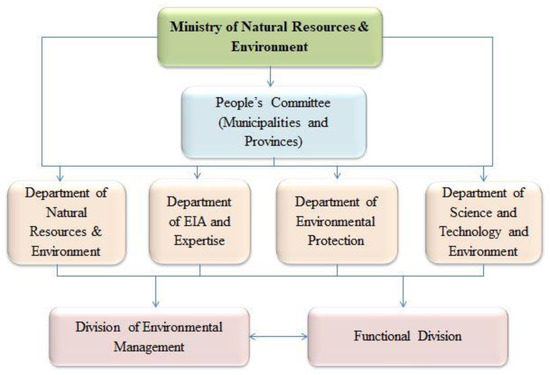
Figure 1.
Environmental management organization of Vietnam. Adapted from Prime Minister of Vietnam; Decree No. 36 for defining the functions, tasks, powers and organizational structure of the Ministry of Natural Resources and Environment, 2017 [29].
Previously, seven ministries jointly managed solid waste for many years, including the Ministry of Natural Resources and Environment, Ministry of Construction, Ministry of Health, Ministry of Science and Technology, Ministry of Agriculture and Rural Development, Ministry of Transport, and Ministry of Industry and Trade. However, from 2019, the Government agreed to assign the Ministry of Natural Resources and Environment as the “focal point” and unified the national management of solid waste. Full responsibility for local waste management was dispensed to the Chair of the provincial People’s Committee (Figure 2).
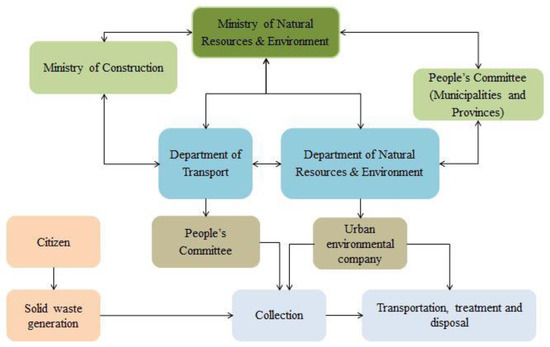
Figure 2.
Municipal waste management system in the urban areas of Vietnam. Adapted from Nhue et al. Solid Waste Management: Municipal solid waste, 2001 [30].
Although many policies have been implemented in Vietnam, the nation’s waste management has been ineffective. Specifically, about waste classification, although numerous programs sponsored by various international organizations to encourage waste separation at source have been conducted in many localities, most of the solid waste in Vietnam has not been sorted effectively. Currently, classification at source is only available with low efficiency and spontaneity in a few localities. Furthermore, after only a short time of execution, the initiative stopped completely due to financial shortage [31]. Additionally, for municipal solid waste, the collection rate increased from 78% in 2008 to 85.5% in 2017 [32]. In rural areas, the rate of waste collection is only approximately 40% [33]. Collection in suburban rural areas or towns or townships reaches a higher rate at approximately 60% to 80% [32]. In most villages and mountainous areas, collection is impossible because of the distance and financial limitation. The public disposes of waste at home by outdoor burning or burying the waste under the ground, thereby causing serious soil and air pollution. In addition, many people have taken their garbage away from their home and dispose them in vacant lands so as to form spontaneous waste dumps that pollute the environment. Furthermore, the recycling rate of domestic solid waste is low at approximately 10% [33]. Recycled waste is collected by a waste picker, junk shops, or junk buyers and then transported to the recycling village. Solid waste recycling activities are small scale, spontaneous, and informal in villages, which lack the management and control of local environmental protection agencies. Most recycling facilities are very small, old, and have outdated technology that causes serious environmental pollution [34].
According to the statistics of the General Department of Environment, an estimated 75 % of collected solid waste is being carried to landfills in 2020 [35]. A total of 904 landfills have less than 20% of hygienic landfill, and the rest involve unhygienic landfills or open dumping (Figure 3). Some hygienic landfills have gas collection systems, whereas others do not. Leachate treatment systems in many places have not reached national technical standards. Leachate is untreated and there is a high risk that it will enter land and groundwater. The foul smell from unhygienic and open dumping also seriously affects the daily lives of the surrounding communities.
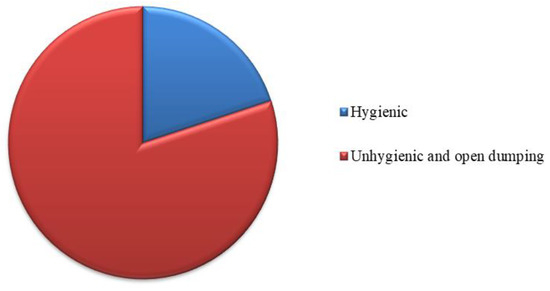
Figure 3.
Hygienic and unhygienic landfill in Vietnam.
A total of 4% of total waste was processed at composting processing plants [33]. However, domestic solid waste is not classified thoroughly, thereby leading to compost products that contain many impurities and which are difficult to consume. 8000 tons or 14% of total waste per day is treated by incineration. Many incinerators, especially small ones, do not have exhaust treatment systems and fail to meet environmental requirements. The working skills of workers are weak, and the incinerators are non-compliant with technical requirements (such as required burning temperatures) or operate waste gas treatment systems, thereby failing to meet environmental protection requirements. The disposal costs between localities are also not strictly managed, a situation which causes a budget loss to the country. As mentioned, the Vietnamese government has issued many policies for domestic waste management. However, policy implementation encountered obstacles that lead to failure and adverse impact to the environment and human health. Consequently, the limitations and barriers leading to failure in policy implementation have been investigated and presented in the following section. This paper aims to determine the limitations, barriers, and challenges of policy implementation in the municipal waste management of Vietnam to understand the situation, strengths, and weaknesses of the system. Then, it discusses proper solutions to improve implementation efficiency. In particular, waste management goals will be easily achieved by improving weaknesses and promoting strengths.
This study consists of five sections. In the Introduction, the background, research dynamics, relevant studies, and waste management situation in Vietnam are presented together with the research objectives. Next, the research methodology is presented in Section 2. In this part, the research implementation process is clearly explained step by step. In Section 3, the results of the investigation are shown (including the results of the survey area, data collection, implementation situation) and then plans from different provinces of Vietnam are also presented here. Section 4 presents the discussion of the findings and a comparison of the policy implementation situations of Vietnam, Malaysia, Brazil, Japan and Taiwan through previous research. Then the solutions for improving policy implementation efficiency are proposed. Finally, the conclusion briefly presents some key findings and future research directions.
2. Materials and Methods
As described in the previous section, this study seeks to understand the situation, limitations, challenges, and solutions in implementing municipal solid waste management policy in Vietnam. To attain the above objectives, several methods were applied and are shown step by step in Figure 4.
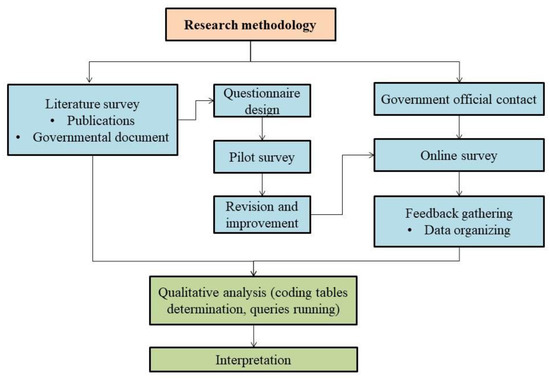
Figure 4.
Research methodology flow chart.
As shown in Figure 4, the first task in this study is to collect data which are available from a variety of sources, but mostly from publications and documents issued by government agencies. These data serve as input for the research and for developing questionnaires to investigate further information that is not yet available.
For questionnaire design, the first step is specifying the information needed. Then, the target respondent is identified. The interviewing method in this work involves an online questionnaire with two sections for a total of 16 questions. On the basis of the study purpose, the questionnaire content includes the following information: waste management concern; current policy and its implementation; and policy implementation situation, difficulties, effectiveness, and solutions. The questionnaire was designed with checkboxes and a multiple choice format to save time of the respondent. Both short and long answer texts for respondents are also accepted if they would like to provide more information. The question structure is designed from general to specific to extract more data with different levels. Next, the completed questionnaire will be tested and modified according to the advice of experts. The experts are researchers with extensive experience in field surveys in Vietnam. Several environmental managers are also included in this stage. Subsequently, the questionnaire will be sent to environmental managers contacted by the author earlier. Questionnaires will be recorded and sent back automatically after the interviewees have finished responding. The collected data will be aggregated and labeled. Then, the queries related to the research goal will be run according to the gathered data. This study mainly uses Microsoft Excel data analysis to store and analyze data. Finally, the results are reported and interpreted. The results are presented in Section 3.
3. Results
3.1. Policy Implementation Situation
Questionnaires were sent to 15 municipal waste management agencies in different regions including Northern, Central, and Southern Vietnam. Nine provinces gave their responses, including Lai Chau, Son La, Ha Noi, Ha Nam, Nam Dinh, Nghe An, Da Nang, Quang Nam, and Lam Dong.
The respondents are all managers with at least 10 years of work experience from the Department and Division of Natural Resources and Environment, the Natural Resources and Environment Monitoring Center, and the Department and Branch of Environmental Protection. First, the question of whether all national policies are in place in all regions of Vietnam was addressed. The results show that the strategy is implemented in all localiies, including the National Strategy for Environmental Protection to 2020 and Vision to 2030 (Decision No. 1216, 2012) and the National Strategy for Integrated Solid Waste Management to 2025, with a Vision to 2050 (Decision No. 2149, 2009).
Other strategies such as the Strategy for the Development of Solid Waste in Urban Areas and Industrial Zones in Vietnam to 2020 (Decision No. 152, 1999) are only implemented in a few localities. Regarding the Decree, the surveyed localities are implementing the Decree on detailing the implementation of several articles of the Law on Environmental Protection (2019).
From 2011 to 2020, the Government of Vietnam had a program to invest in solid waste treatment, but only 60% of surveyed localities have implemented the program and obtained some results such as increased awareness of environmental protection, construction of solid waste treatment plants, and higher rate of waste collection and sorting compared to the pre-investment period. Therefore, not all policies are implemented in all localities of Vietnam.
Each locality chooses its own appropriate local policies. So does this difference lead to different concerns about local solid waste management?
Results showed that waste separation is the biggest concern in Vietnam at present, accounting for 37% (Figure 5). Moreover, the percentage of organic waste in Vietnam is high [33], and localities also focused on composting to reduce the amount of waste. However, this approach can only be implemented once the separation has been successfully performed. This work also confirms that localities are implementing environmental education programs to raise awareness for the younger generation. Waste collection, reduction, and treatment are also among their concerns, with 9% each.
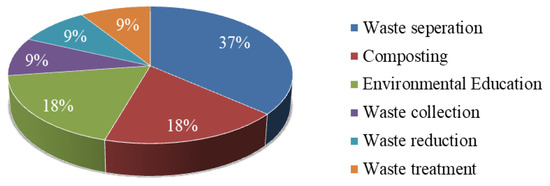
Figure 5.
Waste management concerns in Vietnam.
How have localities implemented these policies? Survey results reveal three main phases in policy implementation: formulating and issuing guidelines, implementation, and reporting. Formulating and issuing guidelines is the first stage to formulating a detailed plan before proceeding with the policy implementation phase. Lastly, reporting of results is needed to evaluate the effectiveness of the implementation.
The result shows that, most of the localities focus on one or two certain phases instead of focusing on all three. Two out of nine cities are interested in all three phases, four out of nine cities are interested in two phases (formulating and issuing guidelines and implementation), and three cities are interested in only one implementation phase (Table 2). The implementation phase is the most interesting stage, and the report phase is the stage which receives the least attention.

Table 2.
Priority of different localities regarding the stages of policy implementation in municipal waste management.
The self-evaluation of localities regarding the effectiveness of policy implementation indicated that high, medium, and low levels account for 33.33%, 22.22%, and 33.33% (Figure 6), respectively. Furthermore, a remaining 11% cannot evaluate their policy implementation effectiveness due to lack of data.
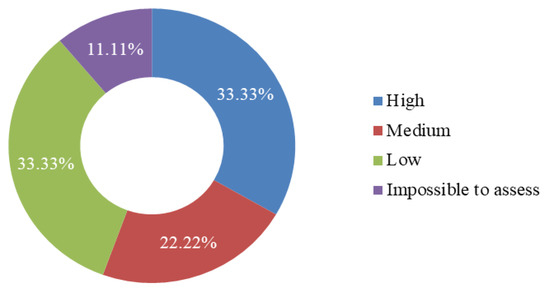
Figure 6.
Effectiveness of policy enforcement in cities in Vietnam.
The current limitations and barriers leading to low enforcement efficiency of the localities are presented in Section 3.2.
3.2. Limitations and Barriers of the Policy Implementation on Municipal Waste Management in Vietnam
The survey results show two main limitations and identify the major barriers that localities face, including the unrealistic nature of policies and lack of resources, which account for 26%, 33% respectively (Figure 7).
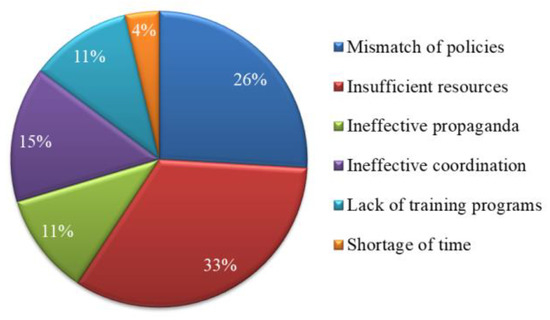
Figure 7.
Limitations and barriers of the policy implementation.
Resources for policy implementation include funding, human resources, and information. Funding and human resources are insufficient, and equipment and needed information have not been fully considered. Policies are often issued by central agencies, but implementation is performed by local authorities. Thus, considerable misunderstanding arises. Furthermore, policies, once enacted, must often wait for implementation guidelines to be developed. The waiting time is long, thereby leading to inadequate time for policy implementation. In terms of resources, survey results indicated that all localities indicated the importance of funding for implementation. Insufficient funding is the biggest constraint that localities are facing. Several other limitations were also presented, such as the low effectiveness of policy propaganda to the people, the assignment and coordination between agencies is ineffective, the scarce training program of staff, the policy implementation time is not long enough, and the necessary information for policy implementation is lacking. Furthermore, little research exists on policy implementation to better provide more information and implementation evaluation has not been fully implemented in Vietnam.
3.3. Locality’s Solution for Successful Policy Implementation of Solid Waste Management in Vietnam
Survey results from different localities show that each locality has its own goals and solutions to increase the effectiveness of policy implementation. This outcome builds on the current situation of each locality. A total of 50% of surveyed localities have no plans or strategies to solve the problem and are waiting for support from the government. Other localities have mentioned the several solutions listed here. First, strict sanctions should be implemented for violators to support waste management policies and optimize social consensus. Second, localities should focus on building serious short-term and long-term waste management plans and pay more attention on separating waste at the source, promote composting from organic waste, and minimize the use of plastic bags and disposable plastic products. Third, localities could invest more in waste treatment plants and call for investment in socialization to reduce the financial burden and improve the public’s responsibility.
What are the favorable factors available to increase the effectiveness of policy implementation in localities?
Increasing public awareness is the most favorable factor to enhance the effectiveness of policy implementation in localities (Figure 8). Several other factors are also considered, such as sufficient coordination, effective propaganda, financial stability, a good management plan, high professional qualifications of officials, and abundant human resources.
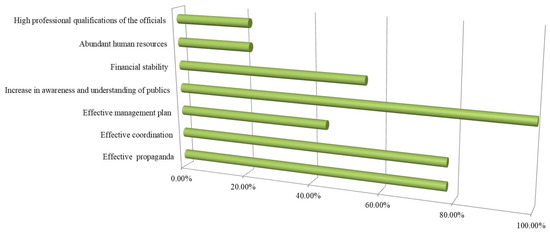
Figure 8.
Factors conducive to increased effectiveness of policy enforcement in Vietnam.
In addition, Vietnam’s Government is paying increasing attention to the implementation of policies in solid waste management through the completion of environmental law, investment in research for development, and promotion of effective policy implementation [23].
4. Discussion
This study has potential limitations. First, the sample size in this study is small. However, in many qualitative studies, including books and articles, the sample size ranges from 5–50 participants only [36]. Second, the respondents’ information was not clearly analyzed in terms of identity, age, gender, and hierarchy position because such details are considered confidential information of the respondents. In addition, the participants were encouraged to discuss and answer the questionnaire in groups with their colleagues to reduce individuality and increase the accuracy of responses.
In this section, the authors discuss the results and how they can be interpreted from the perspective of previous studies and of the working hypotheses. The findings and their implications are explored in the broadest context possible. Future research directions are also highlighted. As explained in the Introduction, Vietnam has a variety of national strategies and regulations related to waste management. However, localities did not implement all of the government’s policies. This outcome can be explained by the financial shortage and the variation in the management localities. The government also does not require all localities to implement all the policies it set out. Furthermore, each policy has a certain goal, such as a policy that focuses on waste separation at source, collection, or treatment program. However, if the classification is ineffective, then relevant policies such as recycling or disposal cannot be implemented properly. Reality has shown the overload of landfills in Vietnam. Waste is not sorted, thereby leading to more and more waste to be buried.
Most of the surveyed localities are very concerned with waste classification. Observations of what has happened over the years as well as literature studies show that Vietnam started to perform waste sorting in the early 2000s [31]. However, after 20 years, waste classification is ineffective because of insufficient resources. Moreover, the implementation budget is insufficient, and the policies are only implemented in a short time. As the survey indicates, localities mostly focused on the implementation phase with little attention to the planning and policy evaluation stages.
In this discussion, the study focuses on two points. First, why are financial shortages and policy mismatches both limitations and challenges for Vietnam? Second, do any similarities exist in policy implementation in solid waste management among Vietnam, Brazil, Malaysia, Japan, and Taiwan? What is the lesson learned from those countries? The details are shown below.
4.1. Financial Shortages and Policy Mismatches Are Limitations and Major National Challenges
All localities believe that the financial shortage and the mismatch of the policies are issues they encounter in the policy implementation process in solid waste management. They represent limitations and major challenges for Vietnam. The population is densely populated, the per capita income is low, and a huge amount of waste is generated; therefore, extensive labor and operating costs are needed for a waste collection and treatment system [33]. Covering the full cost would be difficult for the government. Moreover, calling for investment is still limited in Vietnam. The policies are also evaluated by localities as unsuitable to reality. National policies are announced and must be implemented throughout the territory of Vietnam. However, each locality has different developmental situations and natural, social, environmental, and human conditions. Vietnam is the 65th country in the world in terms of area, but its population ranks 15th. Regarding the state management system, Vietnam is divided into 63 provinces or 63 different management units [37]. Each province has its own area, population, and management system. Therefore, applying the same policy for different regions presents complications regarding implementation. Therefore, understanding the specific situation of a locality and developing its own appropriate plans are necessary. Nevertheless, applying this approach is very difficult in the face of financial shortage. Therefore, these limitations and challenges are like components of a vicious circle for which the country has no suitable solution.
4.2. Policy Implementation Situation in Vietnam, Brazil, Malaysia, Japan, and Taiwan
This study selected Brazil and Malaysia to compare the implementation situation and draw lessons from the many similarities in their contexts, especially regarding waste management. Japan and Taiwan were also included to ascertain how these countries overcome difficulties in implementing waste management policies. Table 3 below shows the situation of waste management in Vietnam, Brazil, Malaysia, Japan, and Taiwan through some key characteristics.
Regarding the policy implementation situation [11], argued that Malaysia has not yet implemented an effective policy in environmental management, thereby leading to many impacts on the environment and human health. Four major reasons were cited by Abas and Wee, including “poor governance, in-effectiveness in monitoring and enforcement, lack of commitment among stakeholders, and neglect of social dimension.” This outcome has shown the importance of policy implementation for solid waste management in Malaysia.
In Brazil, waste management was ineffective because of inappropriate policies and national plans. Inefficiencies in policy implementation in Brazil are also caused by several reasons such as financial shortage, inadequate professional training, lack of human resources, poor technology, weak awareness and low community participation, and mild punishment [4]. Consequently, the national policy has not yielded the expected results in waste management.
In terms of problem solving, Abas and Wee proposed the necessity of stakeholder participation in Malaysia [11]. Furthermore, enhancing their role to share the responsibility for waste management is the most important factor for increasing policy implementation effectiveness.
Cetrulo (2018) suggested some solutions for Brazil, such as strengthening strict supervision in policy implementation, providing adequate resources, enhancing the importance of the capacity of environmental managers, developing national programs for sanitary landfills, and waste minimization plans [4].
Japan has also experienced many years of deadlock in the direction of solving solid waste management. Especially in the 1960s, swift industrialization occurred and the waste also increased rapidly. Immediately, Japan introduced many solutions and strategies to improve its situation, such as through the Act on Emergency Measures concerning the Development of Living Environment Facilities (1963), the Waste Management Act (1970), and the Revision of the Waste Management Act (1976) (Ministry of the Environment, 2014) [38]. These policies also faced various difficulties and had to be revised numerous times in the following years to suit the situation of the country. Determining the right goals, direction, and implementation strategy from the government are important factors that helped Japan overcome the waste pollution crisis and become a model for sustainable development.
Along with Japan, Taiwan experienced a trash crisis 20 years ago. Industrialization causes a constant increase in the waste of Taiwan, similar to other countries. At that time, protests were frequent and tension emerged between the government and citizens as many open landfills seriously affected the quality of life and human health [39]. The new policies were not well received and considered inappropriate and ineffective. Almost every country has encountered this situation while perfecting its waste management program. So, did Taiwan overcome this crisis? The most prominent feature in the process of change was the establishment of the 3R Foundation (reduce, reuse, recycle) in 1994 [40]. At the same time, garbage was classified completely, and two-thirds of the finance was dedicated only to waste management [41]. The recycling program is administered by the Recycling Fund Management Board and another committee with the task of periodically checking the effectiveness of the waste management program [41]. Resource concentration combined with a strict management and monitoring system are the important keys to successful waste management that many countries should learn from Taiwan.

Table 3.
Waste management situation in Vietnam, Brazil, Malaysia, Taiwan, and Japan.
Table 3.
Waste management situation in Vietnam, Brazil, Malaysia, Taiwan, and Japan.
| Characteristics | Vietnam [32,33,42] | Brazil [43] | Malaysia [11,44] | Japan [39,45] | Taiwan [40,46] | |||
|---|---|---|---|---|---|---|---|---|
| 1960–1993 | Recent Years | 1960–2000 | Recent Years | |||||
| 1 | Municipal waste generation per capita (kg/years) | 292 (in 2018) | 300 (in 2017) | 310 (in 2017) | - | 336 (in 2017) | 401.5 (in 1999) | 316 (in 2016) |
| 2 | Waste classification at source | X | X | X | ✓ | X | ✓ | |
| 3 | Complete waste collection | X | X | X | ✓ | X | ✓ | |
| 4 | Landfilling as the main treatment method | 75% (in 2018) | X | 75% (in 2017) | X | ✓ | X | ✓ |
| 5 | Sanitary landfill | 20% (in 2018) | 34.2% (in 2017) | 4.84% (in 2017) | - | 100% (in 2020) | 2.5% (in 1981) | 100% (in 2020) |
| 6 | Recycling rate | 10% (in 2018) | 5.9% (in 2017) | 5% (in 2017) | 3% (in 1993) | 20% (in 2020) | 1.24 (in 1998) | 55% (in 2020) |
Note: -: No data; ✓: Available; X: Not available.
While the waste management situation in Malaysia, Brazil, Japan (1960s), and Taiwan (1960s) is similar, each country has different strategies to solve the problem. Economic growth and waste burden usually go hand in hand. However, different countries have different solutions to improve the situation. Appropriate policies and strategies for the national situation should be given the top priority. On the basis of the current implementation situation and lessons learned from Brazil, Malaysia, Japan, and Taiwan, this study proposed some solutions for Vietnam to overcome the problem. First, a fund that is dedicated solely to waste management needs to be established to ensure that resources are never depleted. The survey results show that the localities all face the problem of insufficient financing. The government has always made certain investments in waste management, but many localities have a financial shortage. The proposed fund not only solves the financial problem, but also allocates finances appropriately with strict oversight and management. Second, localities should call for investment from a variety of sources, including private companies, communities, and government institutions. Moreover, pre-adoption policies should take time to examine, pilot, and evaluate before actual implementation. At the same time, the plan and implementation guidance should be provided as soon as the policy is announced. In addition, the government should provide more training programs to improve officials’ experience. Furthermore, propaganda and environmental education should be promoted so that the public can realize the importance of good waste management. Examining and gathering feedback from the community should be conducted regularly to understand their thoughts, aspirations, consensus, and level of cooperation; this approach is important for effective policy implementation. Collaboration among related agencies is necessary for the policies to be implemented properly. However, a clear division of tasks should be established, and ambiguity in the responsibilities of the stakeholders should be avoided. Lastly, cultural, social, political, and economic factors need to be considered. These suggestions should be combined and implemented at the same time to demonstrate consistency and maximize efficiency in policy implementation. However, a proper plan and in-depth research are needed to achieve the highest efficiency in both economic development and environmental management.
5. Conclusions
Policy implementation is an important stage and the only one for putting theory into practice as well as for realizing national goals. In solid waste management, policy implementation is crucial. A poor waste management situation reflects the ineffectiveness of policy implementation. This study was conducted to identify the situation, limitations, and challenges in implementing the policy on solid waste management in Vietnam. In addition, strategies from the national and local levels were explored. More solutions and strategies were proposed according to the current situation.
Policy implementation varied among localities. Implementation efficiency was assessed by localities as low to medium. Effective waste separation is also a major concern in waste management in Vietnam. Increased awareness is a positive sign for effective waste management. However, policy implementation has not been applied comprehensively, and many important stages such as formulating issues and guidelines were ignored. In addition, the lack of resources and the mismatch of policies have decreased the effectiveness of policy implementation in waste management in Vietnam. To solve the problem, some localities have proposed their action plans, but many localities are waiting for help from the government.
Inefficiencies in policy implementation in waste management have also been found in some studies from Brazil, Malaysia, Japan (1960s) and Taiwan (1960s). Although the implementation situation is similar, the solutions by countries vary. However, these findings provide valuable information for Vietnam in terms of generating more ideas to solve its problems. Besides surveying the environmental managers like this study did, future research should focus on other stakeholders such as residential communities, waste disposal facilities, and NGOs. This approach may help researchers identify new points as well as capture the thoughts, aspirations, and feedback from different stakeholders on policy implementation. Then, the results will be more objective and satisfactory solutions may be readily generated to solve the problem. Effective implementation of solid waste management policy means improved environmental quality and the gradual resolution of waste issues toward sustainability.
Author Contributions
Conceptualization, L.T.K.T., A.H.H. and S.T.P.P.; methodology, L.T.K.T. and S.T.P.P.; software, L.T.K.T.; validation, A.H.H., L.T.K.T. and S.T.P.P.; formal analysis, L.T.K.T.; investigation, L.T.K.T. and S.T.P.P.; resources, L.T.K.T. and S.T.P.P.; data curation, L.T.K.T.; writing—original draft preparation, L.T.K.T.; writing—review and editing, L.T.K.T., A.H.H. and S.T.P.P.; visualization, L.T.K.T.; supervision, A.H.H. and S.T.P.P.; project administration, L.T.K.T. All authors have read and agreed to the published version of the manuscript.
Funding
This research received no external funding.
Institutional Review Board Statement
Ethical review and approval were waived for this study, due to: the data is completely anonymous with no personal information being collected; the data is not considered to be sensitive or confidential in nature; the issues being researched are not likely to upset or disturb participants; vulnerable or dependent groups are not included; there is no risk of possible disclosures or reporting obligations.
Informed Consent Statement
Informed consent was obtained from all subjects involved in the study.
Data Availability Statement
Not applicable.
Acknowledgments
The authors wish to show their appreciation to the environmental managers who gave their full support in responding to the study survey. They also extend special thanks to Nguyen Thi Hong Lam, who currently works in Vietnam Environment Administration, for her assistance in connecting with local environmental managers.
Conflicts of Interest
The authors declare no conflict of interest.
References
- Marshall, R.E.; Farahbakhsh, K. Systems approaches to integrated solid waste management in developing countries. Waste Manag. 2013, 33, 988–1003. [Google Scholar] [CrossRef]
- Jones, S. Waste management in Australia is an environmental crisis: What needs to change so adaptive governance can help? Sustainability 2020, 12, 9212. [Google Scholar] [CrossRef]
- Al-Khatib, I.A.; Arafat, H.A.; Basheer, T.; Shawahneh, H.; Salahat, A.; Eid, J.; Ali, W. Trends and problems of solid waste management in developing countries: A case study in seven Palestinian districts. Waste Manag. 2007, 27, 1910–1919. [Google Scholar] [CrossRef] [PubMed]
- Cetrulo, T.B.; Marques, R.C.; Cetrulo, N.M.; Pinto, F.S.; Moreira, R.M.; Mendizábal-Cortés, A.D.; Malheiros, T.F. Effectiveness of solid waste policies in developing countries: A case study in Brazil. J. Clean. Prod. 2018, 205, 179–187. [Google Scholar] [CrossRef]
- Gunaratne, T.; Krook, J.; Andersson, H. Current practice of managing the waste of the waste: Policy, market, and organisational factors influencing shredder fines management in sweden. Sustainability 2020, 12, 9540. [Google Scholar] [CrossRef]
- Shin, S.K.; Um, N.; Kim, Y.J.; Cho, N.H.; Jeon, T.W. New policy framework with plastic waste control plan for effective plastic waste management. Sustainability 2020, 12, 6049. [Google Scholar] [CrossRef]
- Khajuria, A.; Yamamoto, Y.; Morioka, T. Estimation of municipal solid waste generation and landfill area in Asian developing countries. J. Environ. Biol. 2010, 31, 649–654. [Google Scholar]
- Mahmud, K.; Hossain, M.D.; Shams, S. Different treatment strategies for highly polluted landfill leachate in developing countries. Waste Manag. 2012, 32, 2096–2105. [Google Scholar] [CrossRef] [PubMed]
- Hudson, B.; Hunter, D.; Peckham, S. Policy failure and the policy-implementation gap: Can policy support programs help? Policy Des. Pract. 2019, 2, 1–14. [Google Scholar] [CrossRef]
- dos Muchangos, L.S.; Tokai, A.; Hanashima, A. Analyzing the structure of barriers to municipal solid waste management policy planning in Maputo city, Mozambique. Environ. Dev. 2015, 16, 76–89. [Google Scholar] [CrossRef]
- Abas, M.A.; Wee, S.T. The Issues of Policy Implementation on Solid Waste Management in Malaysia. Int. J. Concept. Manag. Soc. Sci. 2014, 2, 12–17. [Google Scholar]
- Moh, Y.C.; Abd Manaf, L. Overview of household solid waste recycling policy status and challenges in Malaysia. Resour. Conserv. Recycl. 2014, 82, 50–61. [Google Scholar] [CrossRef]
- Manga, V.E.; Forton, O.T.; Read, A.D. Waste management in Cameroon: A new policy perspective? Resour. Conserv. Recycl. 2008, 52, 592–600. [Google Scholar] [CrossRef]
- Mani, S.; Singh, S. Sustainable Municipal Solid Waste Management in India: A Policy Agenda. Procedia Environ. Sci. 2016, 35, 150–157. [Google Scholar] [CrossRef]
- Pham Phu, S.T.; Fujiwara, T.; Hoang, M.G.; Pham, V.D.; Tran, M.T. Waste separation at source and recycling potential of the hotel industry in Hoi An city, Vietnam. J. Mater. Cycles Waste Manag. 2019, 21, 23–34. [Google Scholar] [CrossRef]
- Hoang, G.M.; Phu, S.T.P.; Fujiwara, T.; Pham, D. Van Waste-to-landfill reduction: Assessment of cost-effective solutions using an optimisation model. Chem. Eng. Trans. 2020, 78, 511–516. [Google Scholar] [CrossRef]
- Hoang, G.M.; Fujiwara, T.; Pham Phu, T.S.; Nguyen, L.D. Sustainable solid waste management system using multi-objective decision-making model: A method for maximizing social acceptance in Hoi An city, Vietnam. Environ. Sci. Pollut. Res. 2019, 26, 34137–34147. [Google Scholar] [CrossRef]
- Kawai, K.; Huong, L.T.M. Key parameters for behaviour related to source separation of household organic waste: A case study in Hanoi, Vietnam. Waste Manag. Res. 2017, 35, 246–252. [Google Scholar] [CrossRef] [PubMed]
- Nguyen, H.T.T.; Hung, R.J.; Lee, C.H.; Nguyen, H.T.T. Determinants of residents’ E-waste recycling behavioral intention: A case study from Vietnam. Sustainability 2018, 11, 164. [Google Scholar] [CrossRef]
- Nguyen, T.; Watanabe, T. Autonomous motivation for the successful implementation of waste management policy: An examination using an adapted institutional analysis and development framework in Thua Thien Hue, Vietnam. Sustainability 2020, 12, 2724. [Google Scholar] [CrossRef]
- Schuster, W.M. For the greater good: The use of public policy considerations in confirming chapter 11 plans of reorganization. Houston Law Rev. 2009, 46, 467. [Google Scholar]
- National Assemply of Vietnam Law on Environmental Protection. Available online: http://vbpl.vn/TW/Pages/vbpq-toanvan.aspx?ItemID=36884&Keyword= (accessed on 25 June 2020).
- Prime Minister of Vietnam Approval to Adjust the National Strategy on Integrated Solid Waste Management by 2025, with a Vision to 2050. Available online: https://thuvienphapluat.vn/van-ban/tai-nguyen-moi-truong/Quyet-dinh-491-QD-TTg-2018-dieu-chinh-Chien-luoc-quoc-gia-quan-ly-tong-hop-chat-thai-ran-381368.aspx (accessed on 16 August 2020).
- Prime Minister of Vietnam Solid Waste Development Strategy in Urban Areas and Industrial Zones in Vietnam to 2020. Available online: https://thuvienphapluat.vn/van-ban/tai-nguyen-moi-truong/Quyet-dinh-152-1999-QD-TTg-phe-duyet-chien-luoc-phat-trien-chat-thai-ran-do-thi-va-khu-cong-nghiep-Viet-Nam-den-2020-45446.aspx (accessed on 25 June 2020).
- Prime Minister of Vietnam Solid Waste Treatment Investment Program for the Period 2011–2020. Available online: http://moc.gov.vn/vn/Pages/ChiTietVanBan.aspx?vID=2378&TypeVB=0 (accessed on 6 May 2020).
- Vietnam Government Decree on Waste and Scrap Management. Available online: http://vbpl.vn/botainguyen/Pages/vbpq-van-ban-goc.aspx?ItemID=63061 (accessed on 25 June 2020).
- Ministry of Construction Announce the Norm of Municipal Solid Waste Collection, Transportation and Treatment. Available online: https://thuvienphapluat.vn/van-ban/xay-dung-do-thi/Quyet-dinh-592-QD-BXD-2014-Dinh-muc-du-toan-Thu-gom-van-chuyen-xu-ly-chat-thai-ran-do-thi-242365.aspx (accessed on 25 June 2020).
- National Assembly of Vietnam the Constitution of the Socialist Republic of Vietnam. Available online: https://thuvienphapluat.vn/van-ban/bo-may-hanh-chinh/Hien-phap-nam-2013-215627.aspx (accessed on 27 May 2020).
- Government of Vietnam, Environmental Management of Vietnam. Decree No. 36 for Defining the Functions, Tasks, Powers and Organizational Structure of the Ministry of Natural Resources and Environment. 2017. Available online: https://english.luatvietnam.vn/decree-no-36-2017-nd-cp-dated-april-04-2017-of-the-government-on-defining-the-functions-tasks-powers-and-organizational-structure-of-the-ministry-113479-Doc1.html (accessed on 2 July 2020).
- Nhue, T.H.; Dung, U.Q.; Thai, N.T.K. Solid Waste Management: Municipal Solid Waste; Construction Publishing House: Hanoi, Vietnam, 2001. [Google Scholar]
- Nguyen, T.T.P.; Zhu, D.; Le, N.P. Factors influencing waste separation intention of residential households in a developing country: Evidence from Hanoi, Vietnam. Habitat Int. 2015, 48, 169–176. [Google Scholar] [CrossRef]
- Ministry of Natural Resources and Environment. National Environmental Report in 2017 in Waste Management; Ministry of Natural Resources and Environment: Ha Noi, Vietnam, 2017.
- The World Bank. Solid and Industrial Hazardous Waste Management Assessment—Options and Action Area to Implement the National Strategy; The World Bank: Washington, DC, USA, 2018. [Google Scholar]
- Bui, N.K.; Nguyen, T.L.; Phan, K.D.; Nguyen, A.T. Legal framework for recycling domestic solid waste in Vietnam: Situation and recommendation. E3S Web Conf. 2020, 164, 11009. [Google Scholar] [CrossRef]
- General Department of Environment Hơn 900 bãi chôn lấp rác, Việt Nam xử lý cách nào? Available online: https://baotainguyenmoitruong.vn/hon-900-bai-chon-lap-rac-viet-nam-xu-ly-cach-nao-302818.html (accessed on 20 August 2020).
- Dworkin, S.L. Sample size policy for qualitative studies using in-depth interviews. Arch. Sex. Behav. 2012, 41, 1319–1320. [Google Scholar] [CrossRef] [PubMed]
- General Statistics Office of Vietnam. Census; General Statistics Office of Vietnam: Ha Noi, Vietnam, 2019.
- Japan Ministry of the Environment. History and Current State of Waste Management in Japan; Japan Ministry of the Environment: Tokyo, Japan, 2014.
- Taiwan Ministry of Foreign Affairs Garbage Wars. Available online: https://taiwantoday.tw/news.php?unit=14&post=23865 (accessed on 16 October 2020).
- Houng, H. Policies and Measures of Waste Disposal and Treatment in Taiwan. 2003. Available online: https://www.pecc.org/resources/infrastructure-1/1246-towards-zero-waste-society-new-management-policies-for-solid-waste-disposal-in-chinese-taipei-1 (accessed on 18 October 2020).
- Weston, M.J. Taiwan’s Waste Reduction Miracle. Available online: https://international.thenewslens.com/article/88257 (accessed on 10 December 2020).
- Truong, N. Solid Waste Management in Vietnam: Current Situation, Challenges and Strategies for Development. Master’s Thesis, Metropolia University of Applied Sciences, Helsinki, Finland, 2018. [Google Scholar]
- Alfaia, R.G.d.S.M.; Costa, A.M.; Campos, J.C. Municipal solid waste in Brazil: A review. Waste Manag. Res. 2017, 35, 1195–1209. [Google Scholar] [CrossRef]
- Zainu, Z.A.; Songip, A.R. Policies, challenges and strategies for municipal waste management in Malaysia. J. Sci. Technol. Innov. Policy 2017, 3, 18–22. [Google Scholar]
- Organisation for Economic Co-Operation and Development (OECD). Municipal Waste, Generation and Treatment. Available online: https://stats.oecd.org/Index.aspx?DataSetCode=MUNW (accessed on 24 December 2020).
- Taiwan EPA 4-1 Generation and Treatment of Municipal Waste. Available online: https://www.epa.gov.tw/eng/513B0B39D090DE4C (accessed on 25 December 2020).
Publisher’s Note: MDPI stays neutral with regard to jurisdictional claims in published maps and institutional affiliations. |
© 2021 by the authors. Licensee MDPI, Basel, Switzerland. This article is an open access article distributed under the terms and conditions of the Creative Commons Attribution (CC BY) license (http://creativecommons.org/licenses/by/4.0/).